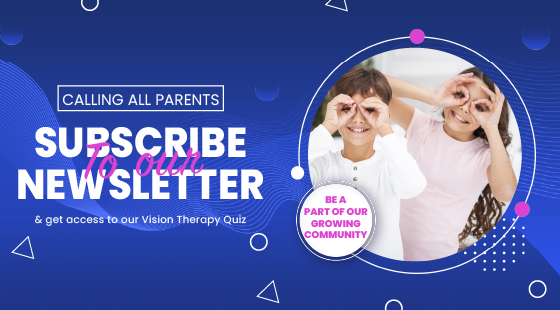
Binocular vision problems can significantly impact daily life, leading to discomfort, visual strain, and difficulties with tasks like reading or driving. Unlike more common issues like nearsightedness, binocular vision issues involve how both eyes work together. At Fox Vision Development Center, we specialize in identifying and treating these conditions to improve your comfort and visual clarity.
Five Common Binocular Vision Problems
Binocular vision problems manifest in many ways, each manifestation requiring its own tailored treatment. Here we discuss some of the most common types of binocular vision problems.
1. Convergence Insufficiency
What is Convergence Insufficiency? Convergence insufficiency occurs when the eyes struggle to work together for close-up tasks, such as reading. When we focus on nearby objects our eyes converge or turn inwards to allow us to see clearly. For those with convergence insufficiency, the eyes don’t coordinate as needed, causing strain and double vision.
Symptoms:
- Headaches or eye strain during reading
- Blurred or double vision
- Difficulty focusing on small print
Treatment: Treatment often includes vision therapy exercises to improve eye coordination. Our eye doctor will implement targeted therapies into your treatment plan to strengthen convergence.
2. Strabismus (Eye Misalignment)
What is Strabismus? Strabismus, commonly known as crossed or wandering eyes, is a condition where the eyes do not align correctly. This misalignment often affects depth perception making it difficult to judge the distance of objects or people, for adults this can hinder their driving abilities and if left untreated in children can lead to lazy eye.
Symptoms:
- Noticeable eye misalignment
- Squinting or head tilting
- Double vision or difficulty judging distances
Treatment: Treatment options vary from vision therapy to corrective lenses and, in some cases, surgery. Early intervention is crucial, especially for children, to prevent long-term vision issues.
3. Amblyopia (Lazy Eye)
What is Amblyopia? Amblyopia, or lazy eye, develops when one eye doesn’t achieve normal vision, usually because it’s not being used as much as the other eye. This is often a result of strabismus, refractive differences between the eyes, or deprivation in early childhood.
Symptoms:
- Reduced vision in one eye
- Poor depth perception
- Squinting or covering one eye
Treatment: Amblyopia treatment typically involves vision therapy, corrective lenses, and sometimes patching the stronger eye to encourage the weaker eye to work harder. At Fox Vision Development Center, we create customized treatment plans to address each patient’s specific needs.
4. Diplopia (Double Vision)
What is Diplopia? Diplopia, or double vision, occurs when a person sees two images of a single object. It can be temporary or chronic and can either be caused by minor eye muscle imbalances or neurological issues/
Symptoms:
- Seeing two overlapping images
- Difficulty focusing or reading
- Eye strain or headaches
Treatment: Treatment may include prism lenses (which bend light to correct double vision), eye exercises, or even surgery if caused by muscle problems. Addressing the underlying cause of your double vision is paramount to correction and our team will work with you to create a tailored treatment plan.
5. Accommodative Dysfunction
What is Accommodative Dysfunction? Accommodation speaks to the eyes ability to correctly adjust and focus when switching between near distance and long distance vision. Accommodative dysfunction involves difficulty adjusting focus, often leading to blurred vision when switching from one distance to another.
Symptoms:
- Blurred vision when shifting focus
- Eye strain during reading or computer use
- Headaches or fatigue with near tasks
Treatment: Treatment for accommodative dysfunction usually includes specialized vision therapy to enhance focusing abilities. Fox Vision Development Center offers tailored exercises and solutions to support comfortable vision at all distances.
Seeking Help for Binocular Vision Problems
Binocular vision issues can impact more than just your sight—they affect your daily activities, work, and quality of life. If you’re experiencing any symptoms, Fox Vision Development Center in Latham is here to help. Our dedicated team provides comprehensive vision therapy and solutions for clearer, more comfortable vision. Don’t let binocular vision problems hold you back and schedule an assessment to begin your journey to clear vision.

